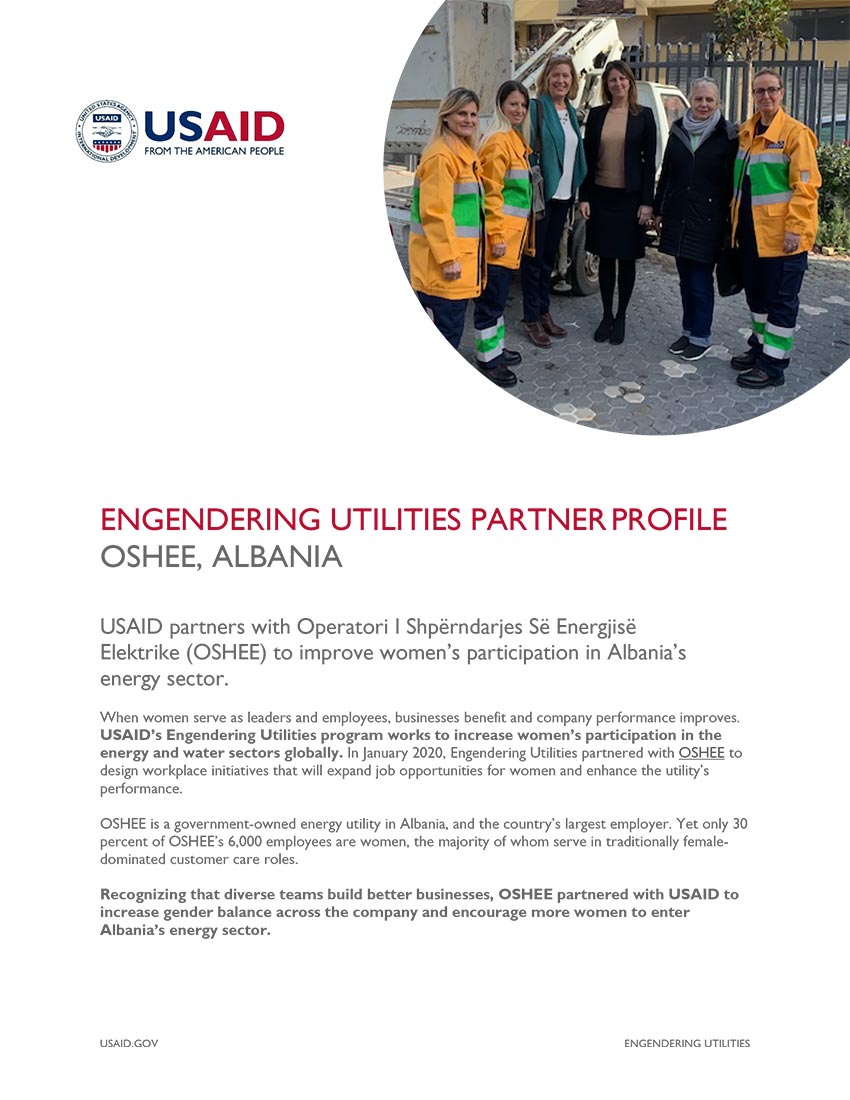- Energy Home
- How We Work
- Programs & Initiatives
- Smart Utilities
- Asia EDGE
- Auction Design Support to Colombia
- Energy Auctions for Kazakhstan’s Green Economy
- Energy Efficiency for Development
- Engendering Utilities
- About
- Business Case
- Approach
- Partners
- OSHEE, Albania
- SONABEL, Burkina Faso
- EDESUR, Dominican Republic
- DELSUR, El Salvador
- EEU, Ethiopia
- Energo-Pro, Georgia
- GRIDCo, Ghana
- BRPL, India
- TPDDL, India
- EDCO, Jordan
- IDECO, Jordan
- Miyahuna, Jordan
- KenGen, Kenya
- Kenya Power
- KOSTT, Kosovo
- LEC, Lesotho
- LEC, Liberia
- EGENCO, Malawi
- EDM, Mozambique
- EKEDC, Nigeria
- IBEDC, Nigeria
- ISWSC, Nigeria
- EVN, North Macedonia
- LASURECO, Philippines
- ZCWD, Philippines
- REG, Rwanda
- OFOR, Senegal
- Senelec, Senegal
- EVN, Vietnam
- Resources
- Stories
- Institutional Framework for Auctions in Mexico
- Powering Agriculture
- The USAID-NREL Partnership
- Scaling Up Renewable Energy
- EmPOWERing Women and Girls
- Competitive Energy Procurement
- Toolkits
- Monitoring & Evaluation
- Resources
- Stories
Speeches Shim
Engendering Utilities Partner Profile
OSHEE is a government-owned electric utility and Albania’s largest employer. The utility has 6,000 employees of which 30 percent are women.
Recent investment in hydropower has increased energy production in Albania, but an over-reliance on this source has left domestic energy production vulnerable to increasingly frequent droughts. The Prime Minister of Albania signed the country’s National Energy Sector Strategy, which seeks to diversify Albania’s energy sources in an effort to provide consumers with a more reliable and affordable energy supply. The Trans Adriatic Pipeline (TAP), which is part of the Southern Gas Corridor (SGC) project, is currently under construction and will significantly increase Albania’s capacity to produce and distribute natural gas across the country and region. Engendering Utilities’ work with OSHEE will ensure women can capitalize on increased investment in Albania’s energy sector as the industry and labor force continue to grow.
A complex web of contributing factors prevents women in Albania from joining the formal workforce, particularly the male-dominated energy sector. While 70 percent of Albanian women pursue a tertiary-level education (compared to 40 percent of men), only 56 percent of Albanian women participate in the formal workforce (compared to 75 percent of men). Despite their higher level of education, women are less likely to occupy higher paying positions. Engendering Utilities is supporting OSHEE to consider and respond to factors that reduce women’s workforce participation by building inclusive policies and practices that benefit men, women, and businesses in the energy sector.
USAID’s partnership with OSHEE will support the utility’s goal of becoming the employer of choice for women in Albania by providing change management coaching and leadership training, conducting a baseline assessment to identify gaps and opportunities for gender equality, and developing a strategic plan with OSHEE to facilitate the company’s gender equality goals, including achievement of a national mandate for 30 percent of company employees to be women.
USAID will support and accelerate existing gender equality initiatives already underway at OSHEE as part of the broader strategic action plan, including the finalization and implementation of OSHEE’s draft gender strategy, which seeks to increase recruitment of female talent as well as professional opportunities for women across the utility.


Comment
Make a general inquiry or suggest an improvement.